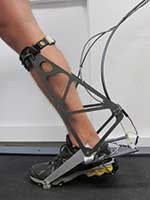
Ankle interface for the assistive ankle robot simulator. Photograph courtesy of Steven Collins, Carnegie Mellon University.
The National Institutes of Health (NIH) has awarded a five-year, $750,000 grant for researchers at North Carolina State University (NC State), Raleigh, and Carnegie Mellon University (CMU), Pittsburgh, Pennsylvania, to compare different robotic ankle devices, based on measurable physiological outcomes, to assist people with stroke-related mobility impairments. The data will then be used to develop standardized performance metrics for a software tool that can be used by prescribing clinicians. The devices that result from the research will provide evidence for making more effective, less expensive, and more manageable assistive technologies, according to NIH.
Greg Sawicki, PhD, assistant professor of biomedical engineering, with the University of North Carolina at Chapel Hill (UNC-Chapel Hill)/NC State Joint Department of Biomedical Engineering, and director of the NC State Human PoWeR (Physiology of Wearable Robotics) Laboratory will collaborate with fellow principal investigator Steven Collins, PhD, a mechanical engineering assistant professor and the director of the Experimental Biomechatronics Laboratory at CMU. Their research will build upon previously developed techniques for robotic prostheses and rehabilitation platforms and adapt them to ankle joint exoskeletons.
The NIH grant comes through the National Robotics Initiative (NRI) to develop a new generation of robots that can improve human capabilities and enhance medical procedures. “These projects have the potential to transform common medical aids into sophisticated robotic devices that enhance mobility for individuals with visual and physical impairments in ways only dreamed of before,” said NIH Director Francis S. Collins, MD, PhD.




